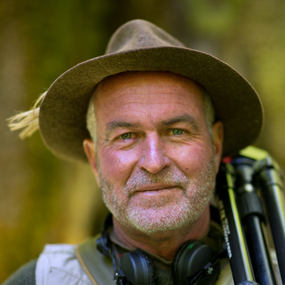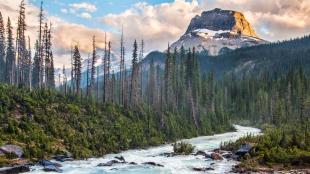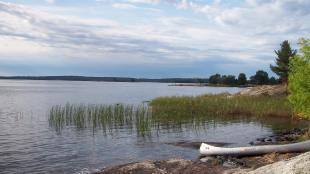

Join BirdNote tomorrow, November 30th!
Illustrator David Sibley and actor H. Jon Benjamin will face off in the bird illustration battle of the century during BirdNote's Year-end Celebration and Auction!

“By modern standards, Mark Twain was really a switched-on listener,” says our Sound Escapes host, Gordon Hempton. “He brilliantly used sound in the crafting of his novels. Birds would sing at the right time of day and in the right situations. He would use thunderstorms to mark the locations of Jim and Huck's journey down the Mississippi.” In this episode of Sound Escapes, we’ll explore what made Mark Twain such an astute listener.
Gordon was particularly inspired by a passage in Twain’s autobiography, in which he describes "a limpid brook" on his Uncle Quarles’ farm near the town of Florida, Missouri. Gordon recreated the sounds of that clear, melodious brook using stones gathered from the original site, which is now a dry creek bed.
"Sonically, we have the interplay between the brook itself and the bird song," Gordon explains. "And it's really an uplifting experience."
Let's listen...
Gordon Hempton: BirdNote Presents.
[Dulcimer Plays]
You're listening to Sound Escapes. I'm Gordon Hempton, the Sound Tracker.
In this episode, we'll listen to the sounds of Mark Twain's Limpid Brook.
By modern standards, Mark Twain was really a switched on listener. He brilliantly would use sound in the crafting of his novels. Birds would sing at the right time of day and in the right situations, he would use thunderstorms to mark the locations of Jim and Huck's journey down the Mississippi.
I came across one passage in his autobiography. It was at his uncle Quarles’ farm outside the small town of Florida, Missouri:
Down a piece, abreast the house, stood a little log cabin against the rail fence; and there the woody hill fell sharply away, past the barns, the corn-crib, the stables and the tobacco-curing house to a limpid brook which sang along over its gravelly bed and yonder in the deep shade of overhanging foliage and vines — a divine place for wading...
Sonically, we have the interplay between the brook itself and the bird song. And it's really an uplifting experience.
Let's listen.
[Music Fades]
[Soundscape of the Limpid Brook]
Gordon Hempton: You've been listening to the sounds of the limpid brook from Mark Twain's childhood.
[Dulcimer Plays]
Sound Escapes is produced by Mark Bramhill and John Kessler. Ashley Ahearn is our editor. Be sure to check out our website, BirdNote.org, to see photos.
This podcast is made possible by Jim and Birte Falconer of Seattle.
In our next and final episode, we explore our common home with all of life: earth, our solar powered jukebox
I'm Gordon Hempton. I hope you'll join me.
[Music Fades]






